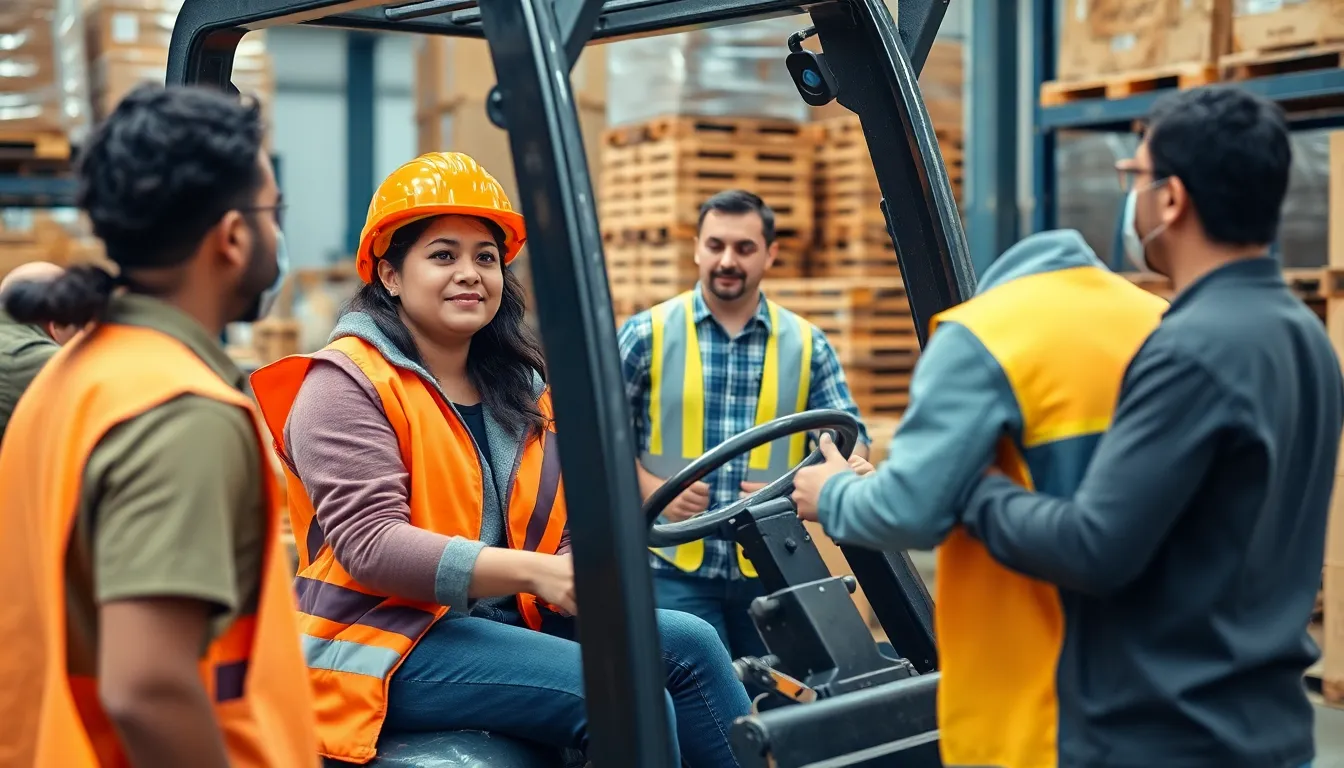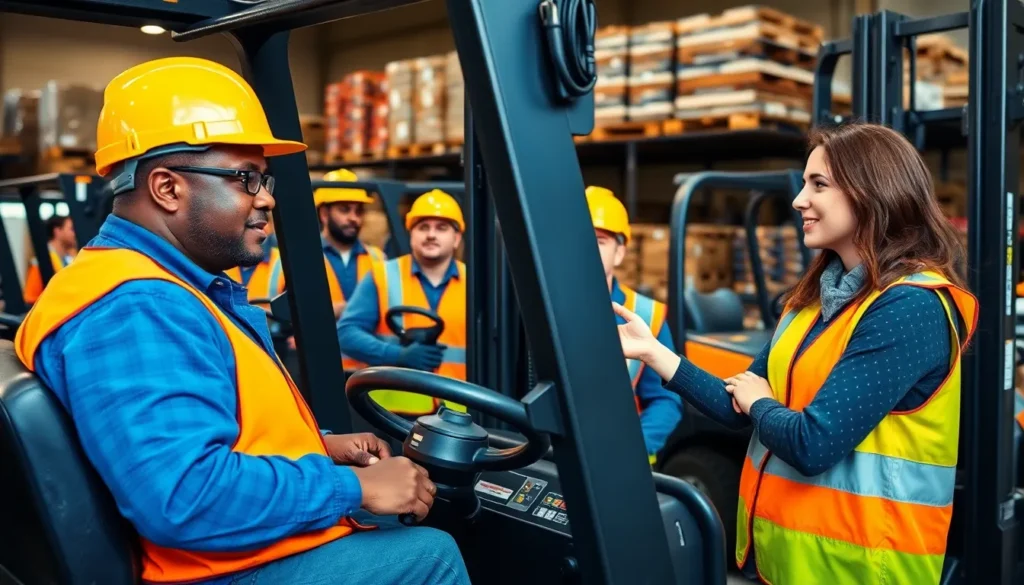In today’s job market, finding a job can feel like trying to find a needle in a haystack—while blindfolded. But what if there was a way to boost those employment odds without breaking the bank? Enter free forklift training for the unemployed! It’s not just about stacking boxes; it’s about stacking the odds in your favor.
Table of Contents
ToggleOverview of Free Forklift Training Programs
Free forklift training programs provide crucial opportunities for unemployed individuals. These initiatives aim to enhance skills and facilitate entry into the workforce.
Purpose and Importance
Free forklift training serves several key purposes. First, it equips participants with essential job skills that are in high demand in various industries. Many employers seek certified forklift operators for their warehouses and distribution centers. Second, such programs often include a focus on safety protocols, which ensures that participants understand how to operate equipment safely. Programs foster confidence, improve employability, and attract potential job opportunities. By offering this training at no cost, organizations play a vital role in reducing unemployment rates and supporting the local economy.
Eligibility Criteria
Eligibility for free forklift training programs usually includes specific requirements. Many programs prioritize unemployed individuals seeking new career paths. Age restrictions commonly apply, with participants generally needing to be at least 18 years old. Some initiatives may require basic literacy and numeracy skills to ensure participants can comprehend training materials effectively. Additionally, residency status may impact eligibility, as some programs specifically serve local communities. Potential candidates often find that demonstrating a commitment to securing employment can enhance their chances of enrolling in these valuable training opportunities.
Benefits of Free Forklift Training

Free forklift training offers several advantages for unemployed individuals, particularly in skill development and enhanced job opportunities.
Skill Development
This training equips participants with crucial forklift operation skills, emphasizing safety and efficiency. They learn to navigate different types of forklifts while adhering to safety protocols. Practical instruction leads to better handling of materials, which is essential in warehouse environments. Certification earned from these programs validates their skills to potential employers. Developments in skills facilitate increased confidence while operating heavy machinery. Access to modern training resources ensures participants receive up-to-date knowledge, making them adaptable to evolving industry standards. Robust training enhances an individual’s marketability in a competitive job landscape.
Job Opportunities
Engaging in free forklift training significantly broadens job prospects for unemployed individuals. Forklift operators are in high demand within various sectors, including logistics, retail, and manufacturing. Many employers seek certified operators to maintain safety and operational efficiencies in their facilities. With certification, individuals gain a competitive edge during job applications. Increased job readiness translates to quicker employment in warehouses and distribution centers. Networking opportunities arise through training programs, connecting participants with industry employers and peers. As a result, participants are better positioned to secure stable, well-paying jobs in their local economy.
Where to Find Free Forklift Training
Finding free forklift training programs can open numerous doors for unemployed individuals. Several avenues provide these opportunities, ensuring skills development and increased employment chances.
Local Community Colleges
Local community colleges often offer free or low-cost forklift training courses. Many of these institutions collaborate with businesses to tailor programs that align with industry needs. Through partnerships with employers, they create training that enhances job readiness. Individuals can typically enroll without extensive prerequisites. Classes include both theoretical instruction and practical experience. Graduates often benefit from job placement assistance, linking them to potential employers in their regions. Community colleges remain a trusted resource because of their accessibility and commitment to workforce development.
Workforce Development Agencies
Workforce development agencies play a crucial role in offering free forklift training programs. Many agencies receive funding from government initiatives aimed at reducing unemployment. These programs often prioritize individuals facing financial barriers. Training typically covers essential skills like equipment operation and safety protocols. Additionally, many agencies provide job search resources and employment counseling to program participants. Connections with local businesses ensure that graduates find job opportunities in their fields. Workforce development agencies, therefore, serve as vital platforms for unemployed individuals seeking certification and industry connections.
Experiences of Participants
Participants in free forklift training programs often share transformative experiences. Many individuals secure employment shortly after completion.
Success Stories
Success stories frequently highlight rapid job placements. For example, one participant, Maria, landed a warehouse position within weeks of earning her certification. Similarly, James transitioned from unemployment to a stable role in a logistics company, crediting his new skills. These narratives exemplify how training empowers individuals to pursue better job opportunities. Moreover, enhanced confidence in operating forklifts leads to positive employer feedback. Certified operators often receive praise for safety awareness and efficiency, bolstering their career prospects.
Challenges Faced
While many succeed, challenges exist during training. Some participants struggle with the technical aspects of machinery operation. Others express concerns regarding meeting eligibility requirements, such as basic literacy. Despite these hurdles, instructors provide tailored support to ensure understanding. Moreover, balancing training with personal responsibilities proves difficult for some. Time management becomes essential for participants aiming to complete the program. Despite these challenges, determination and resilience often lead individuals to overcome obstacles, ultimately achieving their goals.
Free forklift training presents a valuable opportunity for unemployed individuals to enhance their skills and improve their job prospects. By participating in these programs, they gain essential knowledge and certification that can lead to stable employment in high-demand sectors. The support offered through community colleges and workforce development agencies ensures that participants not only learn to operate forklifts safely but also receive guidance in navigating the job market.
Success stories from past participants demonstrate the transformative impact of this training. With determination and the right resources, individuals can overcome challenges and secure meaningful employment. Embracing free forklift training is a proactive step toward building a brighter future and contributing positively to the local economy.






